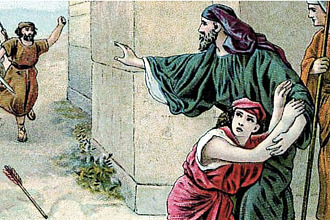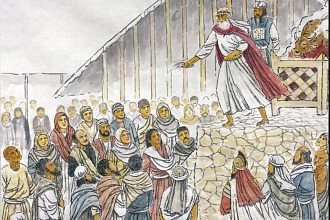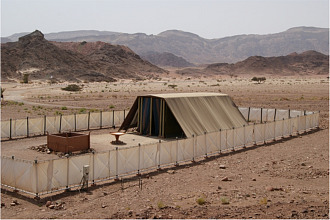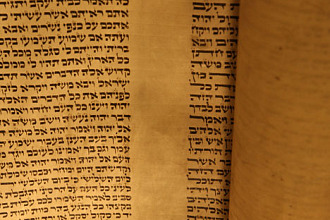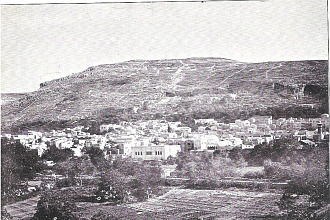Parasha for the Week: Behar: Leviticus 25:1 - 26:2.
Haftarah: Jeremiah 32:6 - 27.
Besorat Yeshua: Mark 3:1 - 12.
Overview
The Torah prohibits normal farming of the Land of Israel every seven years. This “Shabbat” for the Land is called shmita. After every seventh shmita, the fiftieth year the yovel (jubilee) is announced with the sound of the shofar on Yom Kippur. This was also a year for the Land to lie fallow.
G-d promises to provide a bumper crop prior to the shmita and yovel years. During yovel, all land is returned to its original division from the time of Joshua, and all indentured servants are freed, even though they have not completed their six years of work. An Israelite servant may not be given any demeaning, unnecessary, or excessively difficult work, and may not be sold in the public market. The price of his labor must be calculated according to the amount of time remaining until he will automatically become free.
The price of land is similarly calculated. Should anyone sell his ancestral land, he has the right to redeem it after two years. If a house in a walled city is sold, the right of redemption is limited to the first year after the sale. The Levites’ cities belong to them forever. Israel are forbidden to take advantage of one another by lending or borrowing with interest. Family members should redeem any relative who was sold as a servant as a result of impoverishment.
Behar Parasha’s Title
Presenting the laws of the sabbatical year, the Torah opens with this statement: “Then Hashem said to Moses on Mount Sinai” (Leviticus 25:1 TLV). The law of Shmita was given on the Mount Sinai. The word “Mount” in Hebrew is Har, but “on the Mount” is Behar.
Forgiveness and Redemption
Parashat Behar begins with the mitzvah of letting fields rest during the Shmita (Sabbatical year). The Torah states: “Then Hashem said to Moses on Mount Sinai, “Speak to Bnei-Yisrael and tell them: When you come into the land which I give you, then the land is to keep a Shabbat to Hashem. For six years you may sow your field and for six years you may prune your vineyard and gather in its fruits. But in the seventh year there is to be a Shabbat rest for the land—a Shabbat to Hashem. You are not to sow your field or prune your vineyard” (Leviticus 25:1-4). Whatever grew in the seventh year belonged to everyone equally.
The number seven is significant in Judaism. Shabbat is the seventh day. In preparation for receiving the Torah on Shavuot, we count Sefirah (omer) for seven weeks.
The seventh month is the month of Rosh Hashana, Yom Kippur and Succoth. The seventh year is Shmita. After seven Shmita years is the year of Yovel (Jubilee). Seven Shemita is 7 x 7 = 49, and this number is symbolic for forgiveness and redemption—that is why, even in prophecy, this number is significant.
To the prophet Daniel was given the good news of the redemption of Israel and the forgiveness of her sins after 70 weeks which means 70 x 7 days = 490, which is 49 x 10, the superlative of forgiveness and redemption. And this prophecy is not about a relative who would redeem property, but about the Messiah who would forgive and redeem His people. Daniel was told that the Messiah would be sent “to finish the transgression, to put an end to sin, and to atone for iniquity, to bring in everlasting righteousness, to seal both vision and prophet, and to anoint a most holy place” (Daniel 9:24). Just before he received this vision, the prophet Daniel was praying for the forgiveness of his people: “While I was still speaking and praying, confessing my sin and the sin of my people Israel, and presenting my supplication before Hashem my G-d on behalf of the holy mountain of my G-d—yes, while I was praying, Gabriel, the one I had seen in the earlier vision, came to me swiftly about the time of the evening offering” (Daniel 9:20-21 TLV). It is this angel Gabriel who revealed to Daniel the timing of forgiveness for the people of Israel as the pinnacle of the Yovel time: 7 days x 70 weeks = 490 prophetic days or 490 years. Let us remember that 7 x 10 was also the time for deliverance: G-d promised to Jeremiah that the exile to Babylon would last only 70 years (7 x 10 years).
There is even more about the number 7: At a wedding we recite the Sheva’ Brachot (seven blessings). The patriarchs (Abraham, Yitzchak, Yaakov) and matriarchs (Sarah, Rivkah, Rachel, Leah) total seven. Moshe Rabeinu (Moses) was the seventh generation from Abraham (Abraham, Isaac, Jacob, Levi, Kehat, Amram, Moshe). Indeed, our sages say, “The seventh is favored.”
In a practical way, how do we know if a year is the year of Shmita or not. The Jewish people calculate this in an easy way. This current year in the Jewish calendar is the year 5779. Because this number cannot be divided by 7, then we are not in a Sabbatical year. The next Sabbatical year will be in 5782, which comes in 2021-2022 -- let's remember that the Jewish year starts in September.
Haftarah: Jeremiah 32:6 - 27
In Jeremiah 32, Hashem wanted to give an important lesson to Israel. At that time, Nebuchadnezzar and his army were surrounding Jerusalem, and everyone had a mind to flee from Judah. Nobody would think to buy a piece of land when there was no future for the people of Judah and the Holy City; nobody would exercise his rights as a redeemer. But Jeremiah accepted this request as coming from G-d. And Jeremiah did everything that was necessary for this transaction to be legal: “So I bought the field that was in Anathoth from the son of my uncle Hanamel, and weighed him the money -- seventeen shekels of silver. I signed and sealed the deed, called in witnesses, and weighed the money on the scales. Then I took the purchase deed, both the sealed copy, containing the terms and conditions, and the open copy, and I gave the purchase deed to Baruch son of Neriah son of Mahseiah, in the presence of my uncle’s son Hanamel and in the presence of the witnesses that subscribed the purchase deed, before all the Jews that sat in the court of the guard” (Jeremiah 32:9-12). We don’t know anything about this field, but we know the cost: “seventeen shekels of silver.” According to scholars this means seven ounces of silver or almost 200 grams of silver.
It is interesting to read that Jeremiah knew that if these deeds were put into an earthenware jar they would be preserved for a very long time: “Take these deeds—this purchase deed, both the sealed copy and the open copy—and put them in a clay jar, so they may last many days” (Jeremiah 32:14) -- maybe even until today. Maybe one day the archaeologists will tell us they have found those deeds of Jeremiah in one of their excavations in Jerusalem.
Then we have the prayer of Jeremiah: “After I had given the purchase deed to Baruch son of Neriah, I prayed to Hashem, saying:” (Jeremiah 32:16). This prayer begins with a long praise of Hashem (17-23), and then concludes by calling the attention of Hashem to the enemy soldiers who are at the gates of Jerusalem, emphasizing that it was Hashem who told him to buy the piece of land (25). From verse 26 and onward, we have G-d’s answer: “Then came the word of Hashem to Jeremiah, saying: ‘Behold, I am Hashem, the G-d of all flesh; is there anything too hard for Me?’” (Jeremiah 32:26-27). God’s answer continues from verses 26 to 44. Hashem is the G-d of all flesh, not only to the people of Israel—that is why He can use the Chaldeans to punish Israel if that is His will. And then comes the promise of the restoration of Judah: “See, I will gather them out of all the countries, where I have driven them in My anger, My fury, and great wrath, and I will bring them back to this place and cause them to dwell securely. They will be My people, and I will be their G-d” (Jeremiah 32:37–38).
Apostolic Writings: Mark 3:1 - 12
Most of the time parasha Behar is read during the same week as parashat Bechukotai, thus we can affirm that as Behar and Bechukotai are linked together; the two portions of the Besorah in Mark 3, versus 1-12 and 13-30, are linked together.
The parasha Behar is about the Shmitah or Sabbatical year which is every seventh year, with the number “seven” making a strong parallel between the Sabbatical year and the weekly Shabbat. We see the cycle of seven in every calculated time. The Shabbat is on the seventh day, the Shmita is the seventh year, the Yovel (Jubilee) is at the end of the seventh cycle of seven years, and according to the Jewish tradition the earth will be at rest during the seventh millennium (thousand years).
The text of parasha Behar is also about the Yovel or Jubilee year. At the end of every seven Sabbatical years, on the 50th year, the command is to give back to the original owner each piece of land, and to release the slaves, servants and all debts. In fact these two special years (the seventh and the fiftieth) were given to Israel to help them understand the right spirit of Shabbat. As Yeshua said: “Is it lawful on the Sabbath to do good or to do harm, to save life or to kill?” (Mark 3:4). How are we to understand this word “good”? Parasha Behar explains it: Not working in the field, not being worried about what we will eat on that day (Leviticus 25:4-7). Shabbat is not only for the Jewish people but also for the foreign people who are living among them. The Yovel is more than that -- it is a year of freedom and healing for the poor (Leviticus 25:10). This is a year of faith.
At the time of Jubilee there will be no sowing or reaping in the field for two years, the 49th year (regular Shmita) and the 50th year (Yovel) -- two years without sowing or reaping the field. For these years there is a need for great faith!
The year that Yeshua began his ministry was a year of Yovel, and he affirmed this when he preached in the synagogue of Nazareth. The leaders of the synagogue called him to the bimah to read the Haftarah for the week: "The Spirit of the L-rd is upon me, because He has anointed me to proclaim good news to the poor. He has sent me to proclaim liberty to the captives and recovering of sight to the blind, to set at liberty those who are oppressed, to proclaim the year of the L-rd’s favor” (Luke 4:17-19). Then in his sermon he applied this text to himself: “Today this Scripture has been fulfilled in your hearing” (21). During his entire ministry he proclaimed freedom and he healed people, putting upon his ministry the sign of Yovel. This is also why most of the healing acts of Yeshua were performed on Shabbat -- to teach the people of Israel the true spirit of Shabbat: “Again he entered the synagogue, and a man was there with a withered hand. And they watched Yeshua, to see whether he would heal him on Shabbat, so that they might accuse him. And he said to the man with the withered hand, ‘Come here.’ And he said to them, ‘Is it lawful on Shabbat to do good or to do harm, to save life or to kill?’ But they were silent. And he looked around at them with anger, grieved at their hardness of heart, and said to the man, ‘Stretch out your hand.’ He stretched it out, and his hand was restored” (Mark 3:1-5). The hand was “restored,” the same word used to “restore” to a poor man his original property at Yovel (year of Jubilee). The scribes and the Pharisees were shocked by the behavior of Yeshua on Shabbat -- they accused him of breaking the law of Shabbat. However, today the Jewish people have accepted the lesson of Yeshua and say it is allowed to heal sick people on Shabbat -- that life prevails over any other ritual or laws. That is why Rabbis say that if a person is sick or pregnant they do not need to fast on Yom Kippur. And if you are in a state of emergency you can go to the hospital, even using a car, while normally on Shabbat Orthodox Jews don’t use cars.
The true motivation of these Jewish leaders was certainly somewhere else than the correct observance of Shabbat. They were very worried, mostly because they understood Yeshua’s intentions: to restore the Shmita and the Yovel. In fact these two special years were not observed anymore in Israel in the time of the Yeshua. This is one of the ways the Sadducees made their fortunes: They acquired lands for a small amount of money, and they did not restore the poor back to their original property at Yovel. These leaders were afraid that Yeshua would restore this law of G-d and they would lose their properties. That was one of the reasons for the opposition of the leaders.
Shabbat, the Shmita, and the Yovel should be observed in the same spirit. Yeshua was in the synagogue on that day of Shabbat, and said to them that Shabbat is to be a blessing for all human beings, and it is allowed to do good on Shabbat. Putting his action in harmony with his words, he healed this man on Shabbat. Of course, as the leaders said, Yeshua could have healed this man any day of the week; however it was a good time to demonstrate G-d’s love on Shabbat.
Most Christians today don’t keep Shabbat because they have not understood the freedom and the blessing of Shabbat in the Mashiach. They have not understood that Yeshua is the “L-rd of the Sabbath,” which means he was the L-rd who gave Shabbat to Moses on Mount Sinai. Most Christians only see Shabbat through the Jewish tradition and the Jewish way of keeping it. It is time to come back to the true keeping of Shabbat taught by the Mashiach in words and in actions.
The Shabbat command, like all the Ten Commandments, is not a mosaic law. The Ten Commandments existed before the creation of the world. It is G-d who sanctified Shabbat on the seventh-day of the creation week: “Then G-d blessed the seventh day and sanctified it, for on it He ceased from all His work that G-d created for the purpose of preparing” (Genesis 2:3). >/p>









